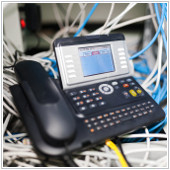 Voice over Internet Protocol (VoIP) technology is a flexible, scalable, and highly efficient communication solution that more and more modern businesses are relying on. However, a large user base makes VoIP an attractive cybercrime target, which means VoIP users face increasing risks. Here are five effective security measures you can implement to protect your business’s VoIP systems and devices from various threats.
Voice over Internet Protocol (VoIP) technology is a flexible, scalable, and highly efficient communication solution that more and more modern businesses are relying on. However, a large user base makes VoIP an attractive cybercrime target, which means VoIP users face increasing risks. Here are five effective security measures you can implement to protect your business’s VoIP systems and devices from various threats.
24/7 monitoring
VoIP security breaches usually take place outside operating hours. Attackers make phone calls using private accounts or access call records with confidential information on the sly. To avoid these security breaches, contract outsourced IT vendors to monitor network traffic for any abnormalities.
Virtual private networks
Virtual private networks (VPNs) create a secure connection between two points, as if they belong in the same closed network. It’s like building a safe secret tunnel between you and the person you’re calling. Using a VPN can also help overcome complications involving Session Initiation Protocol or SIP trunking, which is a recommended VoIP feature.
VoIP firewalls
Firewalls specifically designed for IP-based telephony curb the types of traffic that are allowed into your network. They ensure that every connection is properly terminated at the end of a session and identify suspicious calling patterns. Virtually every VoIP vendor provides these protocols, but you should always consult with your IT services provider as to how these protocols will be managed within your organization.
Encryption tools
VoIP systems that lack encryption can be easily broken into by hackers — even by amateur ones who can simply download and deploy tools to eavesdrop or intercept your calls. Some services claim to have built-in encryption, but companies still need to be vigilant and investigate how effective these are.
Using encryption ensures that even if hackers successfully download audio or video, they still won’t be able to decode the file unless they have the decryption key.
Password protection
Using passwords to authenticate your access to private information is not as secure as it once was. Hackers can easily guess a password and use it for cyberattacks. Protecting the passwords themselves adds a layer of protection against threats. This can entail enabling multifactor authentication or using a password manager to generate and store an array of complex passwords.
VoIP is as important as any of your other network security considerations. It requires a unique combination of protection measures, and we’d love to give you advice on these. Give us a call today to get started.

 Hackers launch denial-of-service (DoS) attacks to render IT systems and networks inaccessible to intended users. Large corporations’ web servers used to be frequent targets, but nowadays, every business can become a victim. Hackers have also started launching attacks on Voice over Internet Protocol (VoIP) systems. This brief guide on telephony DoS attacks can help you become better prepared.
Hackers launch denial-of-service (DoS) attacks to render IT systems and networks inaccessible to intended users. Large corporations’ web servers used to be frequent targets, but nowadays, every business can become a victim. Hackers have also started launching attacks on Voice over Internet Protocol (VoIP) systems. This brief guide on telephony DoS attacks can help you become better prepared.